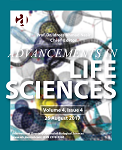21 – 27 August 2017 Google will ask: 'Are you depressed?' People searching for “depression” on Google will soon be prompted to take a questionnaire to assess if they may be suffering from the illness. Find source Arsenic in drinking water threatens up to 60 million in Pakistan It has been called the largest …
Category Archive: Uncategorized
August Issue Published; Vol 4(4)
August issue of ALS is now published. This time, we have featured articles exploring use of Artificial Intelligence in plant disease identification; How N-acetyle cystiene effects mesenchymal stem cells; Anticancer screening of medicinal phytochemicals; A comprehensive review on success of CRISPR plant editing technology; and an interesting commentary on hot debate regarding glyphosate safety. Enjoy reading. Volume …
Seven Days in Life
14 – 20 August 2017 ‘Every 4th’ Pakistani suffering from diabetes According to the survey, 35 million to 37.5 million people above 20 are suffering from this disease in the country, according to National Survey 2016-17 on diabetes. Find source China launches brain-imaging factory Hub aims to make industrial-scale high-resolution brain mapping a standard …
Seven Days in Life
07 – 13 August 2017 Artificial intelligence identifies plant species for science Computer algorithms trained on the images of plants have learned to automatically identify species that have been pressed, dried and mounted on herbarium sheets, researchers report. Find source Using smartphone to detect diseases Researchers have developed technology that enables a smartphone to perform …
Seven Days in Life
31 July – 06 August 2017 First genetically engineered salmon sold in Canada AquaBounty Technologies, company that developed the fish, announced on 4 August that it has sold 10,000 pounds of its hotly debated product to customers in Canada. Find source Indian scientists taking to streets en masse Inspired by April’s global march for science, Indian …
Seven Days in Life
24 – 30 July 2017 Significant ongoing decline in sperm counts of Western men A rigorous and comprehensive meta-analysis of data collected between 1973 and 2011 finds that among men from Western countries, sperm concentration declined by more than 50 percent. Find source Genome-wide cancer 'dependency map' now revealed In one of the largest …
Seven Days in Life
17 – 23 July 2017 Scientists record videos in strands of DNA using CRISPR With the help of the gene editor CRISPR, scientists can now save videos in DNA, Nature writes. The researchers encoded five grayscale images into 104 DNA fragments. Find source US defence agencies grapple with gene drives National security community …
Seven Days in Life
10 – 16 July 2017 How sunlight might have jump-started life on Earth Ultraviolet radiation may have triggered the first reaction that led to iron-sulfur clusters, a key component of metabolism in all living creatures. Find source Cellular thermometer discovered Scientists have identified a mechanism that allows cells to adapt their gene expression program …
Seven Days in Life
03 – 09 July 2017 Snakebites cost Sri Lanka more than $10 million annually Every year, snakebites cost the Sri Lankan government more than US$10 million, and lead to economic loss of nearly US$4 million for individuals, according to a new study. Find source Pakistan is now set for Digital Agriculture era Punjab govt …
Seven Days in Life
26 June – 02 July 2017 Largest-ever study of controversial pesticides finds harm to bees The large-scale field study found that overall, exposure to neonicotinoids harms bee populations. In particular, the pesticides reduce honeybees’ ability to survive their winter hibernation, say researchers. Find source Cancer researchers overestimate reproducibility of preclinical studies Cancer scientists …














